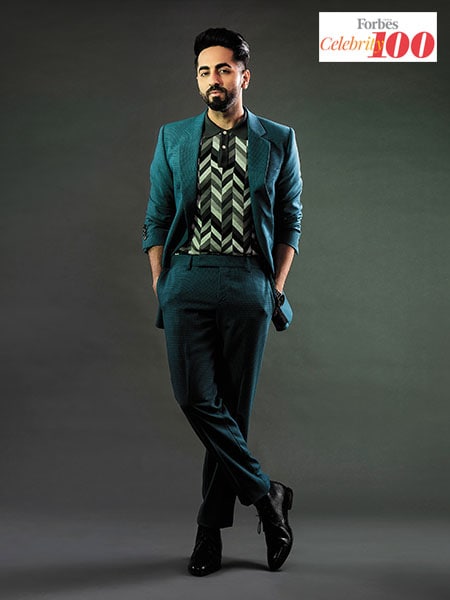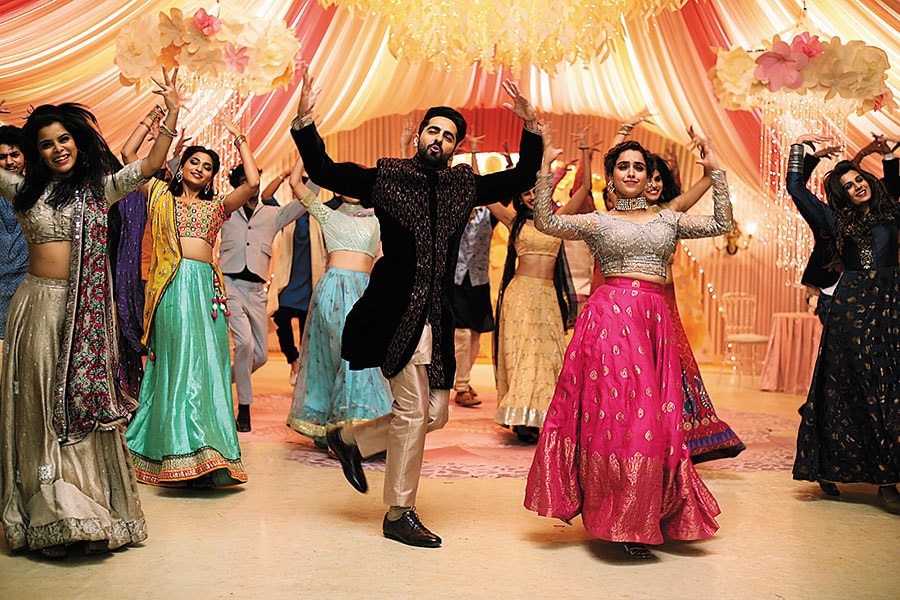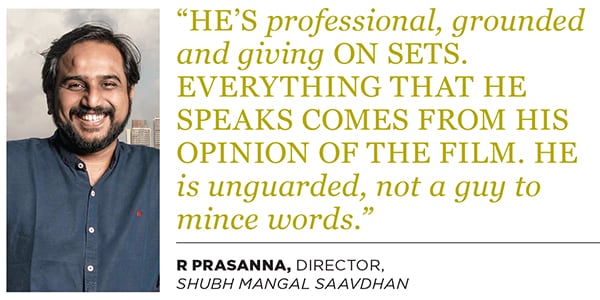Ayushmann Khurrana: Mr Dependable
With four hits in two years, Ayushmann Khurrana has proved himself to be a bankable star. The challenge now is to be more responsible with his choices


 Ayushmann Khurrana, Actor, Fashion Stylist: Isha Bhansali Wardrobe: Teal Suit, from Paul Smith, Geometric Polo Knit Tee from Pretty Green at The Collective Boots from Alberto Toressi Make-up artist: Rashid Gafur Sayyad Hair Stylist: Team Hakim"s AalimAyushmann Khurrana strums an imaginary guitar and melodiously sings lines from an array of Hindi and English songs playing in the background. In between posing for the camera for Forbes India at the Yash Raj Films (YRF) studio in Andheri, Mumbai, the 34-year-old has taken charge of the playlist. He regales the select few present there with anecdotes and personal memories related to each number. Clearly, the RJ-turned-VJ-turned-actor-singer is in a happy space.
Ayushmann Khurrana, Actor, Fashion Stylist: Isha Bhansali Wardrobe: Teal Suit, from Paul Smith, Geometric Polo Knit Tee from Pretty Green at The Collective Boots from Alberto Toressi Make-up artist: Rashid Gafur Sayyad Hair Stylist: Team Hakim"s AalimAyushmann Khurrana strums an imaginary guitar and melodiously sings lines from an array of Hindi and English songs playing in the background. In between posing for the camera for Forbes India at the Yash Raj Films (YRF) studio in Andheri, Mumbai, the 34-year-old has taken charge of the playlist. He regales the select few present there with anecdotes and personal memories related to each number. Clearly, the RJ-turned-VJ-turned-actor-singer is in a happy space.
Professionally, the last 15 months have been blissful for the actor who has had an enviable four hits against his name: Bareilly Ki Barfi (2017), Shubh Mangal Saavdhan (2017), Andhadhun (2018) and Badhaai Ho (2018). The last two films have amassed a combined ₹300-plus crore worldwide at the box office, with his final outing giving him his maiden ₹100-crore blockbuster. Like a batsman who’s hit a purple patch, Khurrana is now Bollywood’s Mr Dependable, six years after making his debut with Vicky Donor (2012).
The acknowledgment is both humbling and rewarding for the lanky star. “It means a lot because it gives you more respect and credibility as an artiste. I have done this with my own conviction, and I am glad that it is working,” says Khurrana, who came from his hometown, Chandigarh, to Mumbai to become an actor in 2006 after completing his post-graduation in journalism.
Khurrana was fascinated with Mumbai from the time he first came to the city in 2002 to participate in Mood Indigo, an inter-collegiate cultural festival organised by IIT-Bombay. “I was in awe of this city. I saw a beach for the first time when I was 18. It was Juhu beach and I was like, ‘Wow, what is this?’ We were three friends who stood there looking at the sea. No words were exchanged. It was such a surreal moment. I still go back to it. That’s when I decided I will stay here and become an actor,” he recalls.
By then, however, he had showcased his multifaceted personality at every possible forum. He was cracking auditions to become a radio jockey and even went to Mica, Ahmedabad, for two months to train to become one. He then worked as an RJ with Big FM in New Delhi, before becoming a VJ with MTV in Mumbai in 2008.
Khurrana was earning enough, so the struggle was not about sustaining himself financially. In fact, he found happiness in small things: Like surreptitiously staying at KEM hostel in Parel for a month. “I was staying illegally with a friend, who was doing his MBBS. We were three people in a small room with a big ceiling fan. We would sleep in our bare necessities if we felt hot, wash our own clothes and even carry a bucket of water to have a bath,” he reminisces.
The challenge was to choose the right script to make his debut on the silver screen from among the plenty that he was being offered. He zeroed in on Vicky Donor in which he played a Punjabi boy from Delhi who donates sperm. It was an unusual role to accept early in his career, but as has been Khurrana’s motto in his journey, he looks at the script objectively, as a whole. Badhaai Ho, a story revolving around late parenthood, is Khurrana’s first ₹100-crore hit“Some popular actors were considered for the role, but we decided to go with a fresh face. My casting director Jogi had seen Ayushmann on TV and thought he fit the part. I had my doubts when I met him… but when he said he had done theatre, I felt a bit assured,” says Shoojit Sircar, who directed the film. Khurrana was subsequently sent for a month-long intensive workshop in Delhi. “I asked him again if he was sure about doing the film. Beech mein bhaag toh nahi jaaoge? [Hope you won’t abandon the project midway.] I was 100 percent sure he would refuse, but he didn’t,” says Sircar.
Badhaai Ho, a story revolving around late parenthood, is Khurrana’s first ₹100-crore hit“Some popular actors were considered for the role, but we decided to go with a fresh face. My casting director Jogi had seen Ayushmann on TV and thought he fit the part. I had my doubts when I met him… but when he said he had done theatre, I felt a bit assured,” says Shoojit Sircar, who directed the film. Khurrana was subsequently sent for a month-long intensive workshop in Delhi. “I asked him again if he was sure about doing the film. Beech mein bhaag toh nahi jaaoge? [Hope you won’t abandon the project midway.] I was 100 percent sure he would refuse, but he didn’t,” says Sircar.
The actor excelled in his boy-next-door role and bagged all the best debut awards that season. The success and acclaim gave him a different high. “A lot of people thought Vicky Donor was an anomaly. But it was a case study in a way. It was one of its kind: A taboo-breaking subject made as a commercial film,” says Khurrana.
*****
The dream start was shortlived though. The going got tough for the newcomer as his next three films—Nautanki Saala (2013), Bewakoofiyaan (2014) and Hawaizaada (2015)—sank without a trace. His indecisive self and desperation to find his own space made him falter. “I started taking a lot of opinions after Vicky Donor… you start playing safe. I have realised nothing is safe. If you transgress the creativity or set rules of the industry, you’ll discover something amazing,” says Khurrana of his learnings from that torrid phase. He has since relied on his gut, and it has yielded favourable results.
The wait for the script that would measure up to the benchmark that Khurrana had set for himself ended with Dum Laga Ke Haisha (2015). Though his co-actor Bhumi Pednekar had an author-backed role as the overweight-but-opinionated Sandhya, Khurrana flourished as a conventional boy from Haridwar who found it miserable to have an obese wife. “Ayushmann comforts you as a co-actor. I am sure he is competitive, but that only helps you become better because he is collaborative as well. He is transparent as an actor and as a human being,” says Pednekar. “There were certain scenes in the film in which I was only looking at him. Those were meant to be my scenes but he had taken them away [with his performance].”
The praise drilled into Khurrana the fact that the audience craved quality content. Once he accepted this reality, he became even more careful in his selection. “As actors, we are too self-obsessed. But people are looking for different stories, not a different you. You should never think in your head that you are bigger than the film. The film is always bigger than you. And only the film will make you a star. Not the other way round,” he says with the maturity of someone who has understood the highs and lows that come with stardom.
*****
The quest, thereafter, has been to remain a bankable star. And if the box office is any indication, he has succeeded. What is impressive is the unconventional nature of the roles he has given his nod to. For instance, playing a man with erectile dysfunction in Shubh Mangal Saavdhan. Its director RS Prasanna says he always had the actor in mind when he decided to remake his Tamil film in Hindi. He remembers meeting Khurrana with just one line to bait him with, even when the script was not ready. “I told him who better than ‘Vicky Donor’ to play this character,” says Prasanna, who describes his first interaction with Khurrana as “love at first sight”. A year-and-a-half later, the actor was laughing aloud during the narration.“Ayushmann has a non-creepy and earnest nature. He can pass off the most awkward situations as funny and cute rather than as creepy. He’s a sweet guy, a charmer, but not cocky. I knew that would be a weapon for me,” says Prasanna, adding that he’s the most responsive actor who can bring to life any input from a director.
Pednekar, who starred opposite him in the film, says to play a character like that shows that he is secure about his craft and masculinity. “From an actor, he is turning into an artiste which is a lovely transition,” she adds.
*****
That artiste came into his own with Andhadhun. Khurrana plays a pianist who acts blind and finds himself in awkward, even life-threatening, situations. When he got wind of the fact that director Sriram Raghavan was making a thriller, the actor messaged him, saying he’d like to work with him. “I was thinking of taking a newcomer, someone who’ll be able to learn the piano, at least the few pieces used in the movie. I wasn’t looking at established stars as they usually have a tight schedule. Out of the blue, I got a message from Ayushmann, and I told myself: ‘Oh hell, I never thought about him,” says Raghavan.
During the script narration, the actor stopped the director midway and told him: “This script is star-proof and not actor-proof. It needs a good actor does not matter whether he’s a star or not.” Raghavan wasn’t keen on an audition, but Khurrana insisted. “We did two scenes, one in which he’s blind and another where he’s play-acting. I wanted to see the subtle difference between the two. Even before we rolled the camera, I was convinced that he was the guy. And the bonus was that he is a musician too,” says the director.
Raghavan goes on to say that he did not “breathe down the actor’s neck”, but Khurrana got a piano organised at home and hired a trainer to learn how to play it. “Andhadhun was different for me because it was a new genre. I had never done a thriller or learnt the piano. It was difficult because I could not look at the keyboard while playing it,” says Khurrana.
What followed was his first ₹100-crore hit, Badhaai Ho, a story of a Delhi boy and his younger brother who are embarrassed with their mother’s late pregnancy. “Once the script was ready, I was the one who said, ‘Let’s go to Ayushmann’. He said the story revolves around the parents, but it is such a genuine film that I want to be a part of this. He has guts,” says director Amit Sharma, who called Khurrana ‘Nakul’ on sets, the name of his character in Badhaai Ho.
Sharma says Khurrana is a hardworking actor who gets into the skin of the character with ease. In Badhaai Ho, for instance, a couple of scenes in which he confronts his girlfriend’s mother were nearly three pages long and the director told him he does not intend to call for a cut in the middle. “I shot those in one take. He is intelligent and caring about his role. He does his homework before he comes on set,” says Sharma.
*****
Khurrana admits that the struggle during his early days was to establish himself as a proven star. Now that he has delivered a string of hits, the expectations have skyrocketed. He’s unfazed by that. “It’s a happy expectation to have. That only gives me the confidence that I should go ahead with my conviction. People relate to me because they think I am one of them. And my choices reflect theirs in a way because I become the audience when I select a script. I take off the garb of a star,” says the actor.
Filmmakers are confident of a brighter future for Khurrana, but also cautious of his real test, which starts now. “He thinks like an audience and anybody who does that will have a long innings in the industry. He places his own intuition over everything else and sees everything as a film first. I see more success for him. This is just the beginning. I see him as a mini Aamir Khan in the making. I can see him ruling his unique space,” says Prasanna.
[qt]If you transgress set rules of Bollywood you will discover something amazing.”[/qt]
Raghavan, who was happily surprised with improvisations from the actor in Andhadhun, says: “He’s got a certain genre where he does these slice-of-life films. I hope he does more adventurous roles also. I think he’ll start getting many more opportunities now. I’d like to see him in challenging performances.”
Sircar has told the actor to not lose sight of his goals. “The medium and stories have opened up. He has to be more responsible with his choices now. He’s come to a stage where he’ll have to experiment more,” says the director of Vicky Donor.
*****
Having made a distinct mark as an actor in a competitive industry despite being an outsider has also helped him evolve, both as an artiste and as a person. Khurrana says he’s become more spontaneous as an actor, something his directors agree with. “He’s a fine actor, a natural,” says Raghavan. “He’s a director’s delight,” adds Prasanna.
The actor admits a lot has changed since he made his debut. “I used to be edgy in the beginning because I suddenly got a lot of fame. I was a newbie and everybody wanted a piece of me. I was just frazzled. In the past six years, I’ve got the perception of the industry right, or maybe about myself. I am more stable as a person I have more clarity in my head,” says Khurrana.
What has remained the same is the simpleton in him. Khurrana still plays cricket with the YRF team under floodlights at a stadium in Malad whenever he finds time. His peers describe him as warm and jovial. Sharma says he cracks at least 50 PJs in a day, of which five are bearable and only one worth laughing at. “But he doesn’t give up… he keeps trying,” he says.
Also, music and the actor are inseparable. “I jam with my musician friends and go for concerts often. Sometimes when I am performing on stage, I wonder if I am really being paid to do this because I enjoy it so much. If your passion becomes your profession, there’s nothing better than that,” explains Khurrana.
While shooting for Shubh Mangal Saavdhan in Rishikesh, the actor had taken his guitar to the sets. Suddenly at 2 am one night, he started playing the instrument and singing old Hindi songs on the banks of the Ganga, much to the amusement of the crew. “This became a daily routine… I’d wait to get a break from setting up the lighting so that I could join the fun,” recalls Prasanna.
Above all, Khurrana has kept his head on his shoulders. And that will come in handy while dealing with being a star. “I try to be as real as possible for my own sanity because if you are acting in films and also in real life, you’ll go mad,” he says.
First Published: Dec 08, 2018, 05:31
Subscribe Now